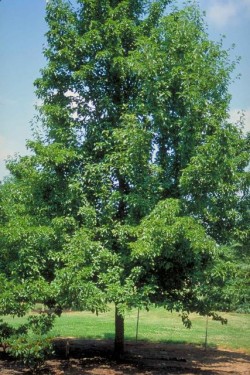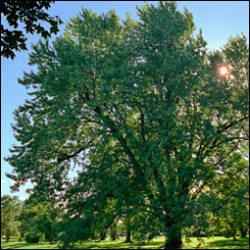Skip to a section:
How Much Do Tree Services Cost in Lansing?
Lansing is home to many different tree species. Many of the trees in this area tend to live for many years and grow extremely long and deep roots. The area is known for its variable weather, many trees often lose limbs or fall onto properties and power lines throughout the year. Since there are many reasons why you may be considering tree removal, this handy guide can give you a better idea of what to expect while you are searching for tree removal services.

How Much Does Tree Removal Cost?
Although trees can help to improve the environment and scenery for any landscape, there are reasons where tree removal is necessary. Removing a tree from your property is a task that is best left to the professionals. Attempting to remove very shallow or deeply rooted trees is very dangerous and can lead to serious injury and expensive property and sewer line damage. The average cost for removing a tree completely from your property ranges anywhere from $170 to $975, with some homeowners in the area paying as much as $1,430.
How Much Does Stump Removal Cost?
The cost of stump removal in Lansing averages around $88.94 to $155.80. Factors that are used to determine the cost of stump removal include the size of the tree stump, the length of its roots and the overall structure of the landscape.
Average Cost of Tree Maintenance in Lansing
Trimming and pruning the trees and shrubs on your property is an excellent way for you to improve and maintain your landscape. It is also a great way to prevent them growing and invading into the clearance space that is required for the electric and cable lines in your area. Although trees grow much slower than shrubs, it is a good idea to have them pruned periodically to keep them in good health. The average cost of trimming and pruning ranges from $312 to $1,127. The size and amount of trees and shrubs that need to be serviced are used to determine the cost of maintenance for your property.
Lansing Tree Facts & FAQs
According to the Michigan Department of Natural Resources (MDNR), much of Lansing’s tree population exists as part of Michigan’s large forestry heritage. Many trees in the city are planted for shade and decoration. However, the trees also provide a variety of health, architectural, environmental and economic benefits, which help to improve the overall quality of life for the entire community.
Tree Service Tips and Regulations
Regulations regarding tree removal in Lansing, Michigan are pretty lax. There are currently no laws or regulations for tree removal in this area. Homeowners do not need any special permits to remove trees from their property.
The best time for tree removal and trimming is during the late fall and early spring. Removing and trimming trees and shrubs during this time is ideal because the removal of limbs is less traumatic to the plant.
Tree Growth and Power Lines
Homeowners that grow trees and shrubs over or near power lines will be given a citation by the electrical company and or city. All offending trees are spray painted for easy identification and removal. Homeowners can contact the company or city directly to learn more about the problem and plan of action for resolution. Although every effort is made by the city government and local electrical company to trim and remove the foliage themselves, there are some circumstances where the homeowner needs to hire a tree removal service to resolve the issue.
The city and electrical company are not required by law to remove any tree remains or debris, such as wood chips and stumps once an electrical line has been cleared. Homeowners should hire a professional tree removal service to ensure that the removal is done to their specifications to avoid property damage and to avoid receiving any citations and fines for violating any city ordinances.
Common & Popular Trees in Lansing
 The state tree is the Eastern white pine (Pinus strobus). This tree can grow as tall as 80 feet, and its pine needles can grow up to 3 – 5 inches in length. The longest living tree species in Michigan is the Northern white cedar. The widest tree is the white willow in Ingham County, with a width of 389 inches as of 2011.
The state tree is the Eastern white pine (Pinus strobus). This tree can grow as tall as 80 feet, and its pine needles can grow up to 3 – 5 inches in length. The longest living tree species in Michigan is the Northern white cedar. The widest tree is the white willow in Ingham County, with a width of 389 inches as of 2011.
According to the MDNR, the most abundant and popular trees in the state include:
- Sugar maple (Acer saccharum marsh)
- Crimson King (Acer platanoides)
- Red maple (Acer rubrum)
- Redspire (Pyrus calleryana)
- Bloodgood (Acer palmatum)
- White oak (Quercus alba)
Lansing is home to the second oldest tree in the state of Michigan. The Dawn redwood (Metasequoia glyptostroboides) is 65 years old and 201 feet tall. It is located in Michigan State University’s Beal Botanical Gardens.
Lansing is home to more than 100 species of trees. Due to its versatile climate, distinct seasons, and favorable soil conditions, trees that grow here can thrive for decades, often reaching heights well over 100 feet.
Trees that thrive best in Lansing include:
- American elm (Ulmus Americana)
- Black gum (Nyssa sylvatica)
- Box elder (Acer negundo)
- Northern red oak (Quercus rubra)
- American beech (Fagus grandifolia)
Due to its climate and season length, cherry and apple trees thrive well in Lansing. These fruit trees grow so well that Michigan has a booming cherry and apple fruit industry that delivers apples and cherries all over the United States. The lemon, peach and avocado trees are also very popular among Lansing residents.
Difficult to Maintain Trees & Diseases
 Due to residential zoning, electrical and other restrictions, homeowners should avoid planting trees that are difficult to maintain. They should also avoid planting trees that are capable of growing more than 65 feet tall. Homeowners should also avoid planting near or underneath power lines.
Due to residential zoning, electrical and other restrictions, homeowners should avoid planting trees that are difficult to maintain. They should also avoid planting trees that are capable of growing more than 65 feet tall. Homeowners should also avoid planting near or underneath power lines.
Trees to avoid include:
Since many homes are located near high voltage lines, homeowners are allowed to plant trees that do not grow taller than 65 feet. Trees such as the Rose acacia (Robinia hispida), crabapple (Malus) and Tartarian maple (Acer tataricum) are good trees to add to any property.
The emerald ash borer is a beetle species that causes significant tree disease and damage to many ash tree species in Lansing. The state of Michigan requires for all infected ash trees to be removed immediately to prevent the disease from spreading.
Plant Hardiness Zones in Michigan

Image credit
Redspire
Local Tree Services in Lansing
